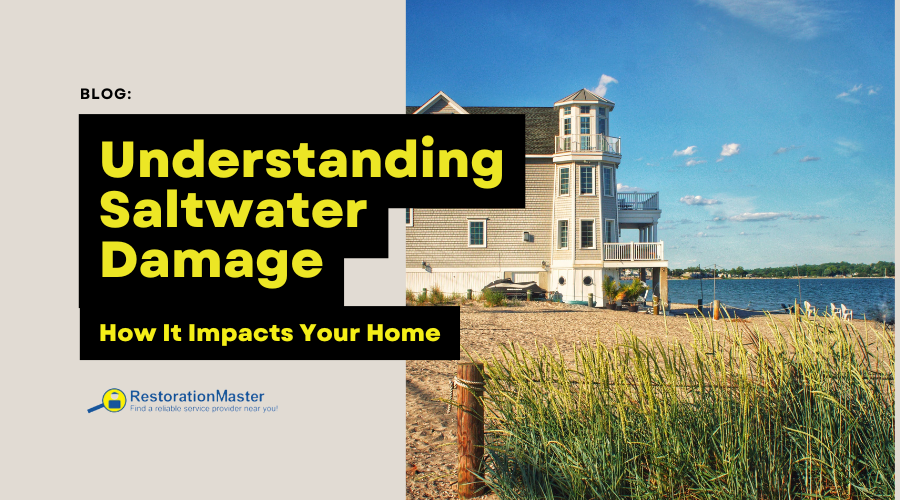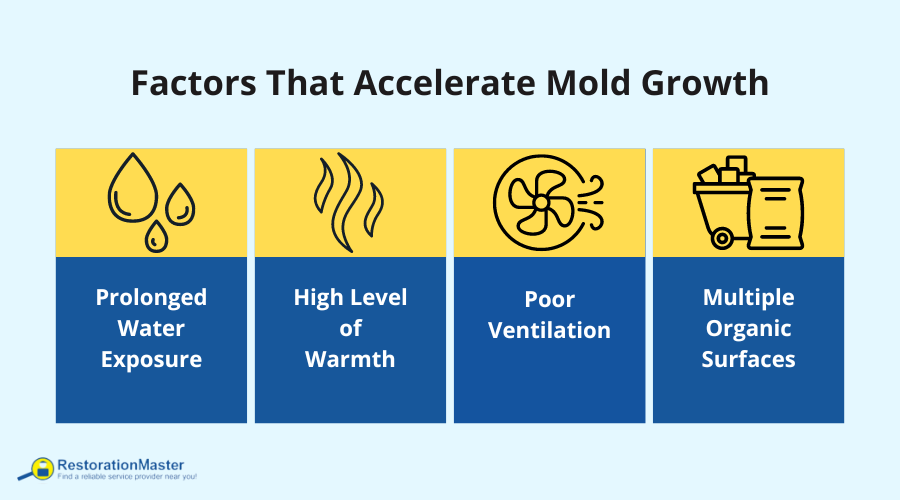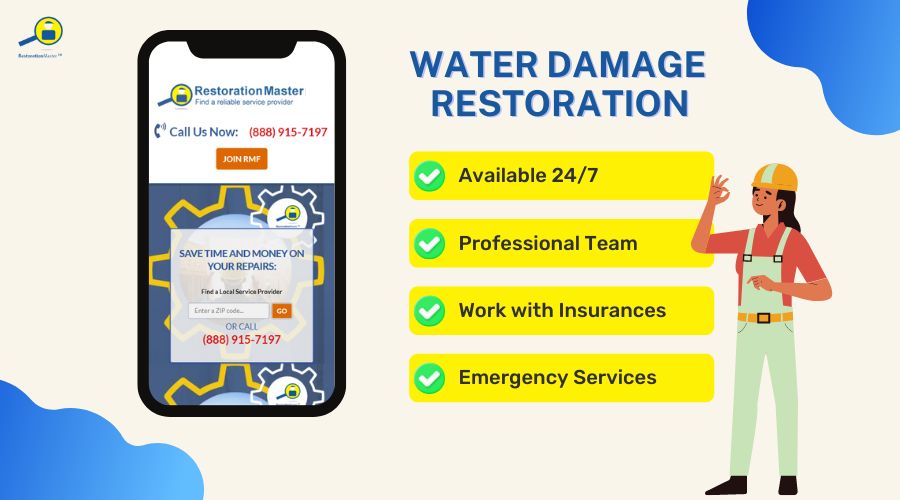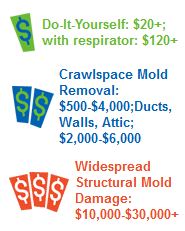Understanding Saltwater Damage: How It Impacts Your Home

Water damage is not always as straightforward as it comes, especially when you must identify the water as either freshwater or the more dangerous saltwater. Freshwater typically comes from a burst pipe or other internal issue and saltwater’s source is natural disasters like a major storm or hurricane. Saltwater is often more dangerous because of salt’s corrosive nature.
Differences Between Saltwater and Freshwater Damage
When it comes to flood damage, the type of water involved—saltwater or freshwater—can significantly affect the extent and nature of the destruction. Freshwater, while damaging to structures and possessions, typically poses less of a threat in terms of long-term corrosion and degradation. Freshwater floods can leadLead is a heavy metal that can be toxic to humans, especiall... More to issues such as moldMold is a type of fungus that grows in damp or humid conditi... More growth and damage to drywall, but they lack the corrosive properties that saltwater brings. In contrast, saltwater floodingFlooding is the overflow or accumulation of water in areas t... More has a higher salinity that enhances its ability to corrode metals and dissolve organic materialsOrganic materials are derived from living organisms, such as... More rapidly. This corrosive nature means that exposed metals, such as copper wiring or steel frames, can suffer significant deterioration within days, leading to costly repairs and potential safety hazards.
Moreover, saltwater’s interaction with building materials can leadLead is a heavy metal that can be toxic to humans, especiall... More to accelerated breakdown. Items like concrete and drywall are more susceptible to damage when exposed to saltwater, which can seep into porousPorous describes a material that contains small openings or ... More materials and weaken their structural integrity. The long-term effects of saltwater floodingFlooding is the overflow or accumulation of water in areas t... More can be devastating, requiring not just immediate cleanup measures but also extensive renovations to restore a property to its pre-flood condition. Homeowners in coastal areas must be particularly vigilant, as the unpredictability of storm surges or heavy rainfall can leadLead is a heavy metal that can be toxic to humans, especiall... More to saltwater inundation, creating a unique set of challenges in cleanup and restorationRestoration is the process of returning a property to its pr... More efforts. Understanding these differences is crucial for effective planning and response following a flood event.
Electrical Charge
Saltwater has an electrical charge, which makes water damage from floodingFlooding is the overflow or accumulation of water in areas t... More and other disasters dangerous if the electricity is on in your property. It is important to cut the electricity in your home as it fills with salt water to remove the electrical current.
Furthermore, the presence of saltwater can create a conductive environment that allows electricity to travel more easily. This poses a severe risk of electrocution, particularly for anyone attempting to navigate through flooded areas. If saltwater makes contact with electrical systems, wires, and outlets, it can short-circuit appliances and create fire hazards. It’s essential for homeowners to be proactive and have emergency plans in place that include shutting off electricity before a floodingFlooding is the overflow or accumulation of water in areas t... More event occurs.
In the aftermath of a saltwater flood, it’s crucial to have an experienced electrician assess your property’s wiring and electrical systems. Corroded components may not show immediate signs of damage, but they can leadLead is a heavy metal that can be toxic to humans, especiall... More to future failures or dangerous situations. Any appliances or electronic devices that were submerged should be considered unsafe and ideally replaced, as the corrosion can undermine their functionality.
In addition to electrical hazards, another critical point to remember is that saltwater can also impact grounding systems, which are designed to protect you from electrical faults. If you suspect your property has been compromised by saltwater intrusion, a qualified electrician should conduct a thorough inspectionInspection is the careful examination and assessment of a pr... More to ensure that your electrical systems are safe and intact.
By understanding the electrical risks associated with saltwater damage, homeowners can take necessary precautions and prioritize safety during cleanup and recovery.

Mold and Mildew
MoldMold is a type of fungus that grows in damp or humid conditi... More is a common concern for homeowners after water damage, especially if salt water is involved. Saltwater damage leads to a higher rate of moldMold is a type of fungus that grows in damp or humid conditi... More growth than freshwater because salt retains more water. After the excess water has been removed from your property, be sure to let the area dry completely before painting or covering it up. Failure to do so could result in moldMold is a type of fungus that grows in damp or humid conditi... More that grows unnoticed.
MoldMold is a type of fungus that grows in damp or humid conditi... More and mildewMildew is a type of fungus that grows on damp surfaces, typi... More are dangerous because they can cause damage to the structureStructure refers to the framework or components of a buildin... More of your building, and health problems to the residents of the property. Be sure to have saltwater damage removed quickly to avoid these perilous issues to your health and building.
Highly Corrosive
Saltwater is highly corrosive. This means that the salt will wear down the concrete and metal in your property. This could leadLead is a heavy metal that can be toxic to humans, especiall... More to severe structural damage. Salt corrodes these building materials slowly, so it may take years before the damage manifests. This is a big problem because structural damage can leadLead is a heavy metal that can be toxic to humans, especiall... More to structural collapse or other disastrous consequences.
The Long-Term Impact of Corrosion
The corrosive nature of saltwater can initiate a chain reaction of deterioration in your home, impacting not only the aesthetics but also the safety and viability of the structureStructure refers to the framework or components of a buildin... More. When salt penetrates concrete and metal, it can cause spalling, where the surface of the material flakes or chips away, weakening the integrity of beams, columns, and other load-bearing structures.
Additionally, any reinforced steel within concrete can experience rusting, which expands as it oxidizes, creating internal pressure that may ultimately compromise the surrounding concrete. This phenomenon, known as concrete cancer, can leadLead is a heavy metal that can be toxic to humans, especiall... More to significant repairRepair is the act of fixing or restoring damaged property, m... More costs and necessitate extensive remediation efforts, such as replacing entire sections of the building.
Saltwater Damage Restoration
Saltwater floods and other causes of water damage are impossible to prevent, so the best course of action is to evacuate the area and follow the advice of local authorities. Only return to your property once a professional has assessed it for signs of damage or danger and has declared it safe for occupancy.
The first thing you should do once you return home is to safely turn off the water and electricity. This makes the area as safe as possible during the water damage removal process. Your plumbing and electricity may have been damaged during the water damage. If so, then it is unsafe to have standing water interact with loose electrical wiring.
Next, call a water damage restorationWater damage restoration is the professional process of clea... More professional to remove saltwater from your home. Only experienced technicians can return your home to its original condition after serious damage from a natural disaster.

Contact Us
You must contact a trained professional to remove the saltwater from your property if you experience water damage. The affected area must be flushed out with clean water, pumped away, and completely dried to prevent moldMold is a type of fungus that grows in damp or humid conditi... More growth. The property will need both internal and external inspectionInspection is the careful examination and assessment of a pr... More before the restorationRestoration is the process of returning a property to its pr... More process can begin.












